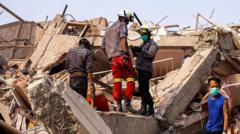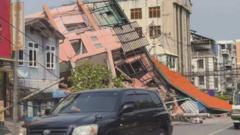As Myanmar grapples with devastation, whispers of the military junta's potential downfall emerge.
# Earthquake in Myanmar Sparks Speculation on Junta's Fate

# Earthquake in Myanmar Sparks Speculation on Junta's Fate
A catastrophic tremor raises questions of regime change amidst long-standing superstition.
In the early hours of March 29, 2025, Myanmar is reeling from a catastrophic earthquake that has claimed the lives of at least 1,000 people and likely many more. Amidst the chaos, citizens question whether this disaster could signify the end of the military junta that has ruled the nation since a coup four years ago. This tremor struck just one day after the junta celebrated the 80th anniversary of the Armed Forces Day with a parade in Naypyidaw, further intensifying the eerie atmosphere surrounding the event.
In Myanmar, where fear and censorship reign, the populace has long turned to omens and rumors for explanations in times of crisis. The political atmosphere has become steeped in superstition since the junta clamped down on free speech, leading many to view the earthquake as a possible harbinger of their leaders' downfall. Astrologers and traditional beliefs dictate that earthquakes during specific months signal the end of regimes, with March noted for its destructive forecasts.
Mandalay, Myanmar's second-largest city and one of the hardest-hit areas, reflects the sentiments of a nation in despair. Local elder Daw Marlar Myint, 89, described the earthquake as nature's judgment on a corrupt ruler. “We have a saying that a massive earthquake like this is nature’s way of punishing a cruel and corrupt ruler,” she lamented, suggesting the military’s potential reckoning may be looming on the horizon.
The ruling junta, whose grip remains strongest in urban centers, faces rising tensions as the nation collectively mourns the loss and evaluates its leadership's stability. As recovery efforts continue and the full impact of this disaster is assessed, many in Myanmar cling to hope that the shake-up beneath their feet may yet signal a more significant change in their governance.
In Myanmar, where fear and censorship reign, the populace has long turned to omens and rumors for explanations in times of crisis. The political atmosphere has become steeped in superstition since the junta clamped down on free speech, leading many to view the earthquake as a possible harbinger of their leaders' downfall. Astrologers and traditional beliefs dictate that earthquakes during specific months signal the end of regimes, with March noted for its destructive forecasts.
Mandalay, Myanmar's second-largest city and one of the hardest-hit areas, reflects the sentiments of a nation in despair. Local elder Daw Marlar Myint, 89, described the earthquake as nature's judgment on a corrupt ruler. “We have a saying that a massive earthquake like this is nature’s way of punishing a cruel and corrupt ruler,” she lamented, suggesting the military’s potential reckoning may be looming on the horizon.
The ruling junta, whose grip remains strongest in urban centers, faces rising tensions as the nation collectively mourns the loss and evaluates its leadership's stability. As recovery efforts continue and the full impact of this disaster is assessed, many in Myanmar cling to hope that the shake-up beneath their feet may yet signal a more significant change in their governance.






















